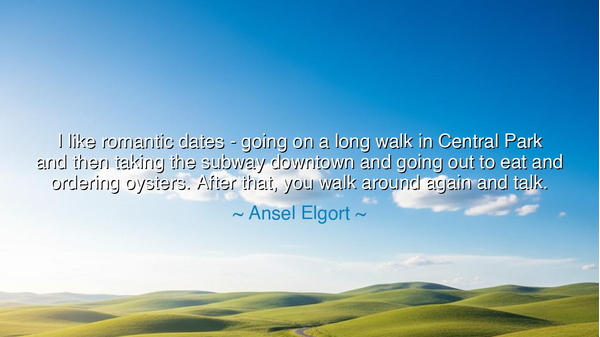
I like romantic dates - going on a long walk in Central Park and
I like romantic dates - going on a long walk in Central Park and then taking the subway downtown and going out to eat and ordering oysters. After that, you walk around again and talk.






Ansel Elgort, with the candor of youth yet the insight of one who values simplicity, once said: “I like romantic dates—going on a long walk in Central Park and then taking the subway downtown and going out to eat and ordering oysters. After that, you walk around again and talk.” In these words, there is more than a description of a date; there is a philosophy of love. For he reminds us that romance is not found only in grand gestures or lavish wealth, but in the small, thoughtful rhythms of life shared together. To walk, to eat, to talk—these are the eternal ingredients of human connection.
The ancients themselves knew the power of walking side by side. In the schools of Athens, Socrates and his companions would wander the streets and gardens, speaking of truth, love, and the soul. The walk became a sacred act, for when two souls move together in the same direction, conversation flows like a river, and hearts open more freely than when seated in rigid halls. Elgort’s words echo this wisdom: love grows not in noise and distraction, but in the shared journey of two people simply moving forward together.
Even the subway in his description carries a hidden symbolism. It is not a carriage of kings, nor a gilded chariot, but a humble train beneath the earth, carrying multitudes. To take such a path with a beloved is to affirm that romance does not demand luxury. It thrives in the ordinary, if only the spirit of companionship is strong. The greatness of love is not in where you go, but in who walks beside you. Thus, Elgort’s vision is both tender and profound: that love finds its nobility in the everyday.
And then comes the sharing of oysters, the food long praised as an emblem of desire and vitality. The meal, in every culture, is more than sustenance—it is communion. To sit across from another and break bread is to enter into a silent covenant of closeness. In choosing oysters, Elgort gestures toward the sensual, the indulgent, but also the timeless. For in every age, from Roman feasts to modern tables, lovers have sat together and deepened their bond through shared food. It is not the dish itself that matters most, but the intimacy it awakens.
Afterward, the return to the walk and to talk completes the circle. For love is not only passion; it is conversation, the weaving together of thoughts, dreams, and stories. History is filled with lovers who spoke through letters—Abelard and Heloise, Elizabeth Barrett and Robert Browning—finding in words the bridge that joined their hearts. Elgort reminds us that the truest romance is not merely in silence or gaze, but in talk, in the opening of souls to one another, without fear, without pretense.
The lesson is clear: the essence of a romantic date is not extravagance, but presence. To walk together, to share food, to converse openly—these are the acts that nourish love. Too often, the world chases glitter, mistaking it for gold, when in truth, love grows stronger in simplicity, where hearts are uncluttered and the focus is only upon one another. The ancient poets knew this, the philosophers taught it, and the modern lover reaffirms it.
So I say unto you, seekers of love: do not be deceived into thinking that romance requires riches or spectacle. It requires only time, attention, and sincerity. Go on long walks, share meals with warmth, and open your hearts in conversation. For in these simple acts lies the deepest power of love. And remember Elgort’s wisdom: romance is found not in the extraordinary, but in the ordinary moments made sacred by presence. Walk, eat, talk—and in doing so, love.






AAdministratorAdministrator
Welcome, honored guests. Please leave a comment, we will respond soon